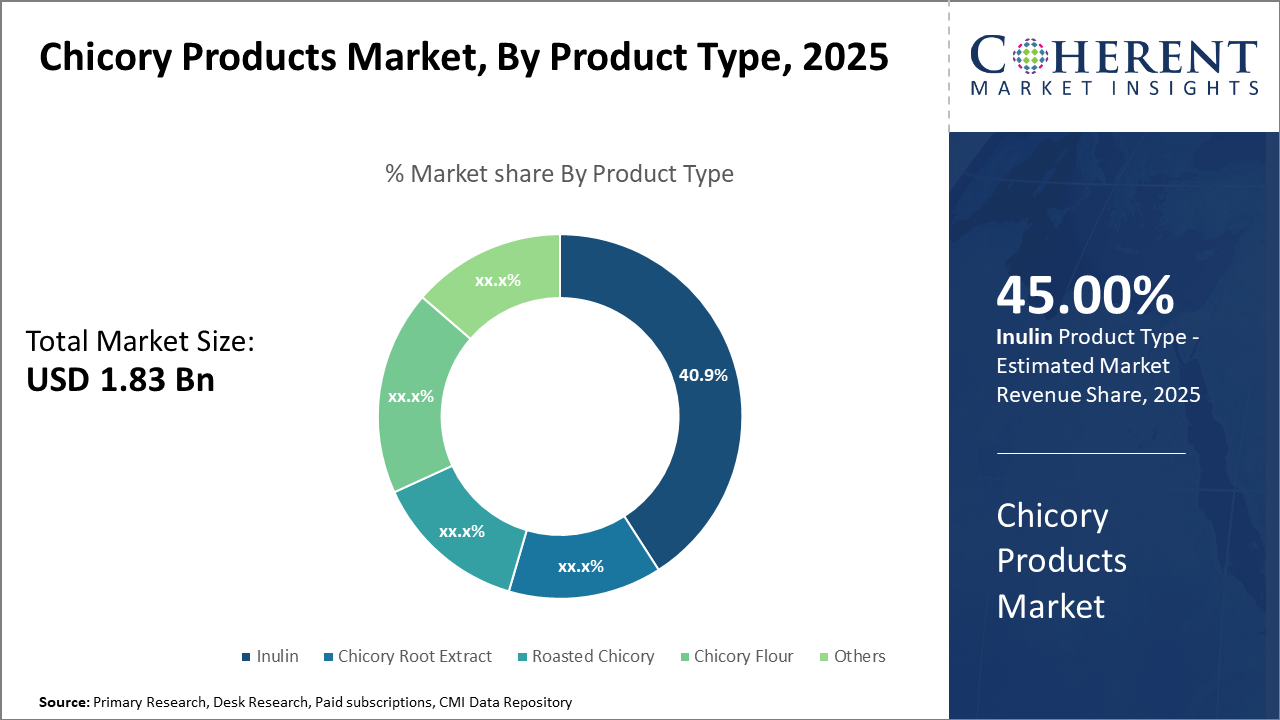Chicory Products Market Size and Forecast – 2025 – 2032
The Global Chicory Products Market size is estimated to be valued at USD 1.83 billion in 2025 and is expected to reach USD 2.92 billion by 2032, exhibiting a compound annual growth rate (CAGR) of 6.8% from 2025 to 2032.
Global Chicory Products Market Overview
Chicory products are derived from the roots of the Cichorium intybus plant and are commonly processed into powders, flakes, and liquid extracts. The key commercial products include inulin, roasted chicory, and chicory powder, each serving distinct markets across food, beverage, and nutraceutical industries. Inulin extracted from chicory is valued as a prebiotic dietary fiber and fat replacer, while roasted chicory is widely used as a caffeine-free coffee substitute. Production involves controlled roasting, extraction, and spray drying processes to preserve flavor and nutritional integrity. As demand for natural sweeteners and gut health ingredients grows, manufacturers are focusing on high-purity, low-calorie inulin variants.
Key Takeaways
The inulin subsegment leads market share within product types, representing 45% of total revenue, driven by its expanding application in functional foods and dietary supplements.
The functional foods application dominates with significant traction, accounting for close to half of the overall market revenue, aided by consumer demand for gastrointestinal health benefits.
Europe maintains a stronghold on industry share with 37%, supported by established production ecosystems and government incentives favoring sustainable chicory farming and processing.
Asia Pacific emerges as a high-growth market with the fastest CAGR due to increasing imports and rising health awareness, providing distinct opportunities for market revenue expansion.
Chicory Products Market Segmentation Analysis

To learn more about this report, Download Free Sample
Chicory Products Market Insights, By Product Type
Inulin dominates the market share due to its wide application as a dietary fiber and sugar alternative in functional foods, beverages, and pharmaceuticals. Its prebiotic benefits continually fuel product innovation and consumer demand. The fastest-growing product type is Chicory Root Extract, gaining traction due to its concentrated bioactive compounds used increasingly in nutraceutical and cosmetic formulations. Roasted Chicory serves as a caffeine-free coffee substitute, maintaining a steady market presence. Chicory Flour is utilized primarily in bakery and animal feed, experiencing moderate growth.
Chicory Products Market Insights, By Application
Functional Foods and Beverages dominate due to rising consumer health consciousness and demand for gut-friendly products, particularly in developed regions where dietary fiber enrichment is prioritized. Pharmaceuticals witness accelerated growth as clinical research validates chicory’s prebiotic and anti-inflammatory properties, spurring product launch activity. The Animal Feed segment leverages chicory products for digestive benefits in livestock, growing steadily. Personal Care applications are emerging rapidly, especially in skincare products incorporating chicory root extract for antioxidant benefits.
Chicory Products Market Insights, By Form
Powder dominates the market share. They are preferred for ease of handling, shelf stability, and versatility in product formulation, contributing to their dominant industry share. Liquid chicory products are growing faster, driven by demand in beverage formulations and cosmetic serums. Granules mainly serve pharmaceutical and animal feed applications, experiencing moderate uptake. Other forms include tablets and capsules, which cater primarily to the dietary supplement industry but represent a smaller market slice.
Chicory Products Market Trends
Recent market trends in chicory products emphasize a shift towards multifunctional ingredient use, combining prebiotic benefits with natural sugar replacement.
For instance, 2024 witnessed a 15% rise in functional beverage launches incorporating chicory inulin, reflecting consumer demand for health-enhancing ingredients.
Additionally, sustainability has become a dominant theme, with many companies adopting eco-friendly farming and processing techniques, leading to certifications that strengthen market positioning in Europe and North America.
The acceleration of personalized nutrition approaches employing chicory derivatives in dietary supplements also signifies an evolving market shift.
Innovations in extraction and formulation have further enhanced market dynamics, enabling chicory products to penetrate novel industrial applications such as cosmetics and animal nutrition.
Chicory Products Market Insights, By Geography

To learn more about this report, Download Free Sample
Europe Chicory Products Market Analysis and Trends
In Europe, the chicory products market holds the dominant industry share at 37%, underpinned by its established agricultural base and advanced processing infrastructure. Countries such as Belgium and France lead in chicory root production, supported by favorable government policies encouraging sustainable farming. European market players like Cosucra Groupe Warcoing and Beneo GmbH significantly contribute to the region’s stronghold through continuous R&D and supply chain integration, ensuring consistent market revenue growth despite volatility in global trade.
Asia Pacific Chicory Products Market Analysis and Trends
Meanwhile, the Asia Pacific region exhibits the fastest market growth, with a CAGR outpacing others due to rapid urbanization, rising disposable incomes, and increasing health awareness. Countries like China and India are primary drivers, boosted by rising imports and emerging local production. The expanding pharmaceutical and functional food industries leveraging chicory ingredients, combined with supportive government initiatives on food security and safety, enhance this rapid expansion. The influx of global chicory product companies into this region further augments growth prospects.
Chicory Products Market Outlook for Key Countries
USA Chicory Products Market Analysis and Trends
The USA market exhibits substantial growth fueled by evolving consumer preferences for digestive health products and natural sugar alternatives. In 2025, the U.S. functional foods segment accounted for nearly half of the North American chicory product consumption. Industry frontrunners have heavily invested in R&D, introducing tailored inulin-based formulations for clinical nutrition and weight management. Regulatory guidance from the FDA affirming chicory inulin’s prebiotic qualities has accelerated product approvals, boosting market revenue. Leading U.S. companies emphasize sustainability and supply chain resilience to withstand global trade fluctuations, reinforcing business growth.
India Chicory Products Market Analysis and Trends
India’s market is witnessing rapid adoption of chicory products, especially in dietary supplements and functional beverages. The country’s increasing health awareness and government initiatives promoting indigenous plant-based ingredients have stimulated market expansion. In 2024-2025, imports surged by more than 18%, with pharmaceutical and nutraceutical sectors driving demand. Emerging local manufacturers are also scaling up production capabilities, narrowing dependency on imports. Strategic alliances among market companies are facilitating technology transfer and product innovation, fostering competitive market dynamics.
Analyst Opinion
Supply-side improvements in chicory root cultivation have significantly enhanced production capacity, with European farmers increasing yield per hectare by over 10% in 2024, reinforcing supply stability. This has been pivotal in meeting rising market demand without inflating market prices, which remained relatively stable amid increased production.
Demand-side dynamics illustrate growing imports of chicory-derived inulin in Asia Pacific, with countries like India reporting a 15% year-over-year rise in imports from Europe in 2025, primarily driven by health supplement manufacturers. This import trend reflects expanding application usage across emerging markets, diversifying market revenue sources beyond traditional regions.
Functional food applications remain the dominant end-use, constituting 45% market share in 2025, particularly in digestive health products. Recently launched clinical studies from 2024 emphasized chicory inulin’s prebiotic effects, prompting enhanced product development and increased market traction in North America and Europe.
Price volatility for chicory products narrowed in 2025 due to improvements in supply chain logistics, supported by enhanced cold chain infrastructure in key exporting nations. This has led to a 7% reduction in delivery lead times, which positively impacted buyer confidence and supported steady business growth within the market segments.
Market Scope
| Report Coverage | Details | ||
|---|---|---|---|
| Base Year: | 2025 | Market Size in 2025: |
USD 1.83 billion |
| Historical Data for: | 2020 To 2024 | Forecast Period: | 2025 To 2032 |
| Forecast Period 2025 to 2032 CAGR: | 6.8% | 2032 Value Projection: |
USD 2.92 billion |
| Geographies covered: |
|
||
| Segments covered: |
|
||
| Companies covered: | Agrana Beteiligungs-AG, Cosucra Groupe Warcoing, Nutrabiotic LLC, Beneo GmbH, Sensus, Ingredion Incorporated, B.T. Commodities Ltd, Meiji Holdings Co., Ltd., Cargill, Incorporated, Puratos Group, Inovapotek. | ||
| Growth Drivers: |
|
||
Uncover macros and micros vetted on 75+ parameters: Get instant access to report
Chicory Products Market Growth Factors
The rising consumer focus on gut health and digestive wellness drives the increasing incorporation of chicory-derived inulin, creating substantial demand growth across dietary supplement sectors. Regulatory recognitions in the EU and the U.S. regarding the health benefits of chicory components have accelerated product approvals and encouraged market penetration. Moreover, advancements in extraction and processing technologies have enhanced product purity and scalability, reducing operational costs and expanding market scope. Lastly, increasing adoption of chicory ingredients as sugar substitutes in low-calorie sweeteners supports growth, underscored by a 9% surge in low-sugar food launches incorporating chicory in 2025 globally.
Chicory Products Market Development
In January 2024, Beneo GmbH launched a new line of chicory inulin products tailored specifically for the dietary supplement market. Derived from natural chicory root, these inulin ingredients are designed to support digestive health, improve calcium absorption, and promote beneficial gut microbiota. The launch strengthens Beneo’s position in the functional ingredient space by meeting the rising global demand for prebiotic fibers and clean-label nutritional solutions.
In July 2024, Blue Bottle Coffee introduced the NOLA Craft Instant Coffee Blend, a convenient instant adaptation of its signature New Orleans-style coffee that features roasted chicory for a rich, smooth flavor profile. The launch combines the brand’s artisanal brewing standards with instant convenience, catering to modern consumers seeking premium, ready-to-enjoy coffee experiences without compromising on taste or quality
Key Players
Leading Companies of the Market
Agrana Beteiligungs-AG
Cosucra Groupe Warcoing
Nutrabiotic LLC
Beneo GmbH
Sensus
Ingredion Incorporated
B.T. Commodities Ltd
Meiji Holdings Co., Ltd.
Cargill, Incorporated
Puratos Group
Inovapotek
Companies leverage strategies like vertical integration for raw material sourcing—Beneo GmbH’s investment in chicory root farms resulted in a 12% reduction in production costs in 2024. Similarly, Ingredion Incorporated expanded its product portfolio with tailored inulin solutions for the pharmaceutical industry in 2025, capturing new market segments and improving its competitive market position.
Chicory Products Market Future Outlook
The chicory products market is projected to experience strong growth due to rising health consciousness and the expanding application of prebiotic fibers in functional foods. Ongoing research into the synergistic benefits of inulin with probiotics will create new formulation opportunities in dietary supplements. Additionally, manufacturers are expected to enhance process efficiency and sustainability through waste valorization and energy-efficient extraction techniques. Asia-Pacific and Europe will remain major producers, while demand in North America will surge due to increasing use in low-sugar and high-fiber products. The trend toward plant-based and gut-friendly foods will continue to drive innovation, leading to the development of new product formats and integrated prebiotic blends.
Chicory Products Market Historical Analysis
The chicory products market has its roots in traditional European agriculture, where roasted chicory was long used as a coffee substitute. Industrial processing evolved in the late 20th century to focus on extracting inulin—a soluble dietary fiber and prebiotic—from chicory roots. The rise of the functional food and beverage industry in the 2000s significantly boosted demand for chicory-derived fibers, used to enhance gut health, texture, and sugar reduction in food formulations. Technological advancements such as enzymatic extraction, membrane filtration, and spray drying enabled the production of high-purity inulin and fructooligosaccharides (FOS) for nutraceuticals and dairy applications. Growing awareness of digestive wellness, combined with increasing consumer preference for natural and clean-label ingredients, positioned chicory products as essential components in modern food manufacturing.
Sources
Primary Research Interviews:
Food technologists
Dietary fiber experts
Dairy product formulators
Functional beverage manufacturers
Databases:
FAOSTAT (Crop Data)
USDA Crop Production Statistics
European Commission Food Composition Database
Codex Alimentarius Standards
Magazines:
Food Navigator
BeverageDaily
Functional Foods Weekly
Dairy Industries International
Journals:
Journal of Functional Foods
Food Hydrocolloids
International Dairy Journal
Food Chemistry
Newspapers:
The Hindu (Agriculture)
Financial Times (Food Industry)
The Guardian (Health)
Associations:
International Food Information Council (IFIC)
Association of Food Scientists and Technologists
European Inulin Producers Association
Share
Share
Missing comfort of reading report in your local language? Find your preferred language :
Transform your Strategy with Exclusive Trending Reports :
Frequently Asked Questions
Select a License Type
Joining thousands of companies around the world committed to making the Excellent Business Solutions.
View All Our Clients